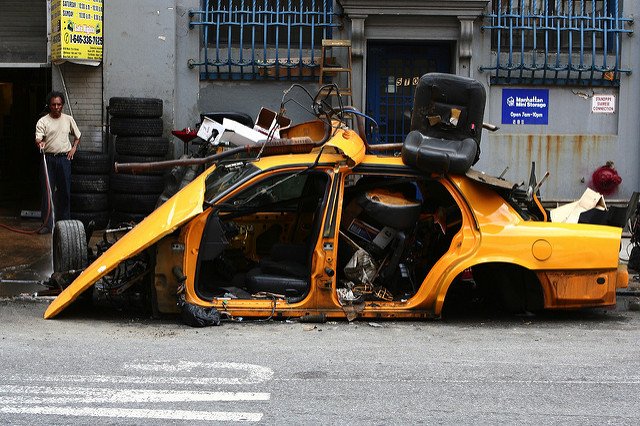De Blasio Announces Investigation Into Exploitative Taxi Industry After Years Of Neglect
May 21, 2019, 12:59 p.m.
Mayor Bill de Blasio has ordered a review of predatory practices in the New York City taxi business, following a scathing report on the industry's predatory practice and regulatory failure.

Mayor Bill de Blasio has ordered a review of predatory practices in the New York City taxi business, following a scathing report in the New York Times detailing how powerful industry leaders inflated medallion prices and exploited drivers as local officials willfully ignored warning signs about the collapsing market.
"The review will set down strict new rules that prevent broker practices that hurt drivers," the mayor said in a statement on Monday. "It's unacceptable to prey on hardworking New Yorkers trying to support their families and we'll do all that we can to put an end to it."
After reaching a high of $1 million in 2014, the price of a medallion has plummeted in recent years, with the city's largely immigrant drivers facing the brunt of the consequences. Close to 1,000 medallion owners have filed for bankruptcy, and at least eight professional drivers have taken their own lives in the last 18 months.
Brother of missing cabbie Kenny Chow makes emotional plea for info. His cab last seen E86st street #CarlShurz park on 5/11. @NYPDDetectives . Police cameras here pic.twitter.com/6R2fSwFGp6
— Juliet Papa (@winsjuliet) May 22, 2018
But while that collapse has been widely blamed on the arrival of rideshare companies, a two-part Times investigation traces much of the devastation to lax oversight and reckless lending practices of shady brokers and big banks, which apparently saw an opening to take advantage of immigrant drivers. In some cases, drivers making $30,000 a year said they were duped into signing contracts with hidden fees that left them on the hook for millions. Those contracts were fueled by practices "strikingly similar to those behind the housing market crash," according to the paper, and created a system that one analyst likened to "modern-day indentured servitude,"
In response to the reporting, de Blasio has announced a multi-agency investigation to be overseen by the Taxi and Limousine Commission, the Department of Finance and Department of Consumer Affairs over the next 45 days. New York Attorney General Letitia James will also probe the "disturbing reports" to see if lenders engaged in illegal activity.
Beyond the egregious lending activity, the Times exposé suggests that federal, state, and city officials worsened the crisis, then essentially abandoned financially ruined drivers. Under Mayors Bloomberg and Mayor de Blasio, the city made more than $855 million through selling taxi medallions and collecting taxes on private sales. Even as concerns about the medallion bubble swirled, the Taxi and Limousine Commission, a city agency ostensibly in charge of regulating the industry, declared the investment "better than the stock market."
Someone asks how many of the assembled cab drivers have financial hardship. Everyone raises their hands. “You should be asking how many of us are close to suicide” says one driver
— de Blasio doesn’t control the subway (@FelipeDLH) May 22, 2018
While that regulatory neglect has roots in the early 1990s, the ruinous policies were continued by de Blasio, according to the Times. A close ally of the taxi industry, the current mayor and presidential candidate continued the practice of placing "political allies inside the Taxi and Limousine Commission and [directing] it to sell medallions to help them balance budgets and fund priorities." According to Politico, four of the mayor's ten major bundlers in his 2013 campaign had ties to the taxi industry. When the medallion market crashed, de Blasio opted not to fund a bailout.
On Monday, Council Member Ritchie Torres alleged that his own efforts to probe the industry were stymied by the de Blasio-controlled agency. "The T.L.C. hasn't just been asleep at the wheel, they have been actively stonewalling," he said.
NYC TLC Commissioner Meera Joshi is chased away from a @NYTWA-organized vigil for Uber driver Fausto Luna. Joshi said she came here to pay respect to Luna’s life, attendees blame TLC inaction for the hardships of drivers. pic.twitter.com/c9GZAAk15G
— Vincent Barone (@vinbarone) October 7, 2018
Meera Joshi, the de Blasio-appointed leader of the T.L.C. who stepped down earlier this year, essentially admitted as much, telling the Times: “There were lots of players, and lots of people just watched it happen. So the T.L.C. watched it happen. The lenders watched it happen. The borrowers watched it happen as their investment went up, and it wasn’t until it started falling apart that people started taking action and pointing fingers."
On Monday, the Taxi Workers Alliance, a group that represents drivers, praised New York officials for finally paying attention to the crisis. But they also wondered what took so long, and whether the city would actually take steps to help drivers impacted by decades of failed policy.
"We've been sounding the alarm on the crisis of suicides, foreclosures, and bankruptcies among our city's professional drivers for years," said NYTWA Executive Director Bhairavi Desai in a statement. "It shouldn't have taken nine suicides and thousands of families destroyed for people to listen, but we are determined to end this crisis."